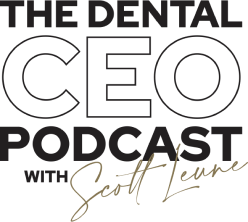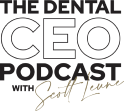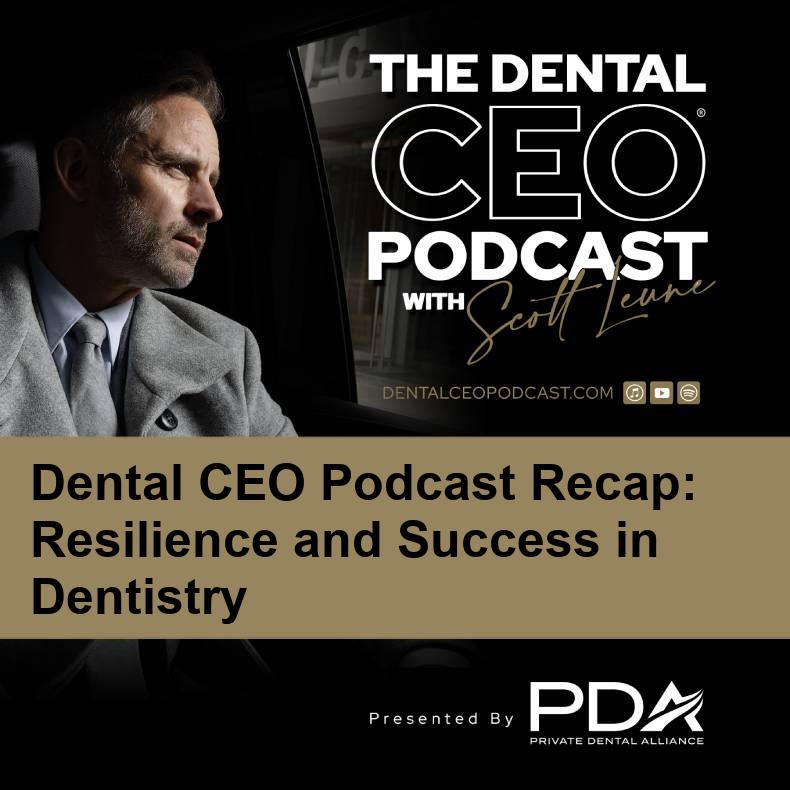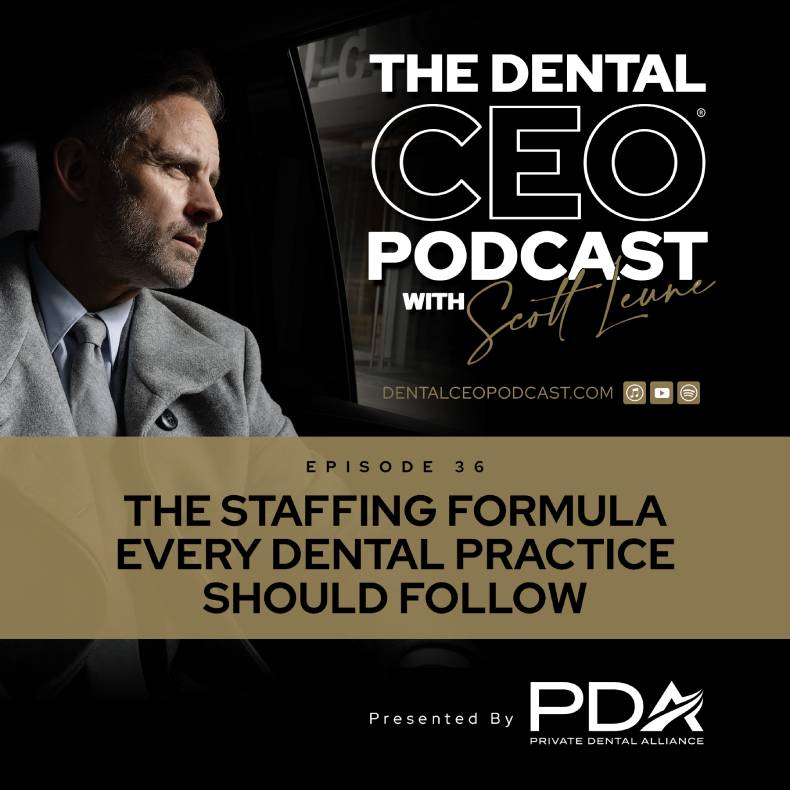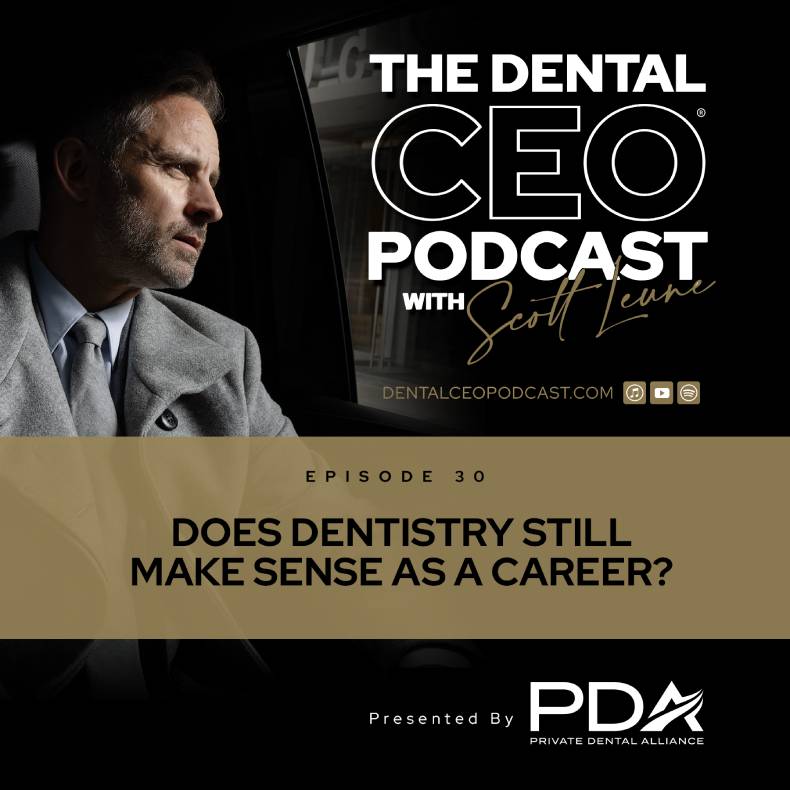Dental CEO Podcast #18 – Human-Centered Leadership: Leading People, Growing Practices
In this episode of the Dental CEO Podcast, host Scott sits down with leadership expert Ryan Estis to explore the transformative power of human-centered leadership in dental practices. Discover how empathy, meaningful conversations, and a focus on employee development can revolutionize your practice, leading to higher retention rates, improved patient trust, and exceptional care. Ryan shares actionable insights and strategies from his book “Prepare for Impact,” offering a roadmap for dental professionals to create a thriving, people-focused environment. Whether you’re struggling with employee engagement or looking to enhance patient loyalty, this episode provides the tools you need to lead with impact and drive sustainable growth in your practice.
Highlights
- Human-Centered Leadership- The importance of putting people at the center of strategy and decision-making, emphasizing the impact on employees and customers.
- Recruitment and Retention- Strategies for attracting and retaining talent, including creating a compelling employment value proposition and investing in employee development.
- Leadership and Coaching: The role of leaders as coaches, helping employees develop a vision for their careers and lives.
- Impact on Business Growth- How human-centered leadership can lead to better patient care, higher employee engagement, and ultimately, business growth.
Speakers
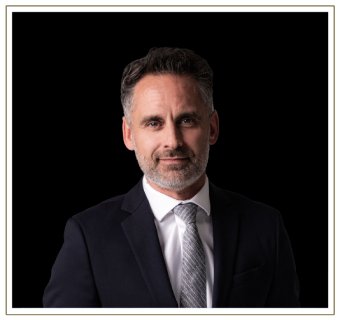
Dr. Scott Leune
Scott Leune, known as The Dental CEO, is one of the most respected voices in dental practice management. From his seminar room alone, he has helped launch over 2,000 dental startups and supported more than 20,000 dentists across practices worldwide. Named one of the 30 Most Influential People in Dentistry, Leune delivers practical, no-fluff strategies that empower dentists to lead with confidence, scale efficiently, and achieve real personal and financial success.
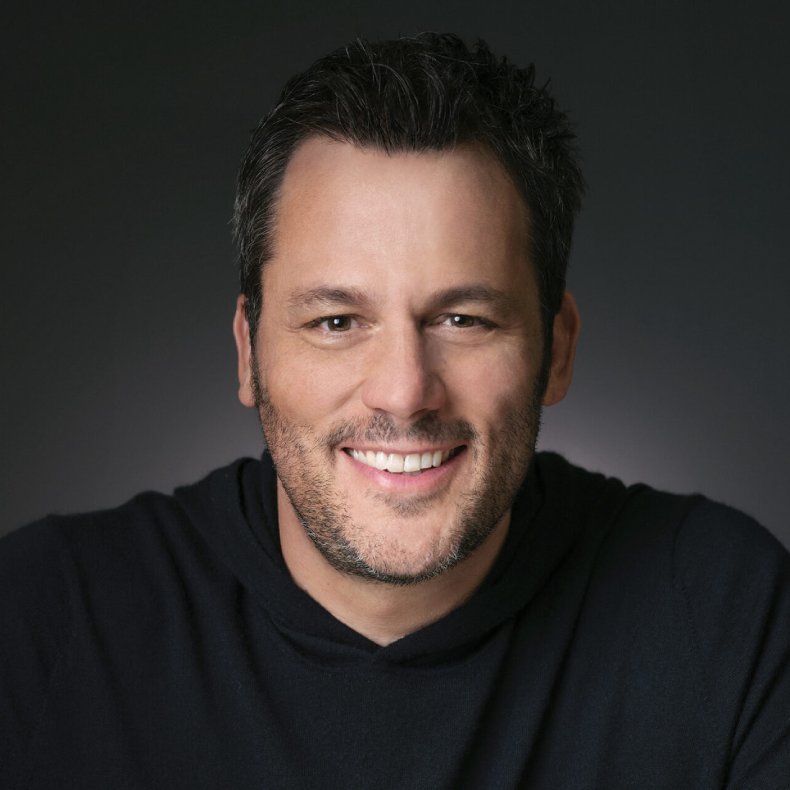
Ryan Estis — Leadership & Performance Expert
Ryan Estis is a seasoned expert in sales, management, and leadership. He spent 15 years working in a Fortune 500 company, where he rose to the position of Chief Revenue and Strategy Officer. He later founded his own consulting business, focusing on thought leadership, speaking, publishing, and executive coaching. Ryan is also a partner at Impact 11, a thought leadership accelerator helping entrepreneurs scale their practices.
Watch Episode
Read Full Transcript
Scott Leune: This podcast is sponsored by dentalmarketing.com and they have agreed to give the listeners of this podcast a free competitive marketing analysis. This analysis is going to show you very clearly how your practice is doing compared to your competitors. It's going to give you the health of your SEO, it's going to give you a website grade, and you'll also see what your competitors are up to. This helps you know what ad strategy you should have today, how clean and effective is your marketing right now Find out by getting this free and detailed analysis. Text the word marketing to 4 8, 6, 5 9, and you'll receive this competitive analysis from our sponsor dentalmarketing.com. Alright Ryan, so thank you again for coming on and giving us your time. I'm really excited to talk about actually a list of topics that you've become an expert in. And I know you've also in the past spoken to dentistry at conferences and different companies, so I'm really excited that we dive in here. Now, before we do that, some of our listeners may not know who you are. Do you think you could give kind of a summary of who you are, what you do, where you came from, who is Ryan Estis?
Ryan Estis: Yeah, well a couple of things. One, I grew up in a house with two school teachers as parents, so I think the teaching gene was always in me, but I spent 15 years working in a Fortune 500 company, grew up on the sales side of the business and then ultimately made the segue into management and leadership. The last job I had there, I was the chief revenue and strategy officer, so I had a pretty big enterprise and was responsible for revenue in our go-to market and p and l. And then I made the shift into starting my own business 15 years ago. And the segue really was focused on consulting and then ultimately speaking became a catalyst to drive clients into the sculpt consulting practice, but really grew into a life of its own. So I would say today the practice is much more focused on thought leadership. Speaking is one way to deploy expertise, publishing books, publishing content online. I still do some consulting and executive coaching work. And then I have a separate business with three partners called Impact 11, which is essentially a thought leadership accelerator. So if you're an expert at something, how do you take that expertise, monetize it and grow it? So I'm helping a lot of other entrepreneurs scale their practice through Impact 11 and we built a team and we're growing that community, we're growing that membership. So yeah, I've experienced on both sides.
Scott Leune: Lemme ask you, if I had you at in a board meeting and you were a board member, I brought you into my organization, what's that superpower that you have that made me or compelled me to want you at the table helping me make decisions? Or in other words, what are you most known for in this world of business? What kind of expertise or advice are you finding yourself giving to a lot of people helping them with?
Ryan Estis: I would say it's the practical application of ideas and insights that help a business grow. So that's a pretty broad umbrella, but I think why I'm invited into those kinds of meetings or why the book or some of the keynote topics are resonating, there is an energetic exchange where I think people go to a conference, they look for a dose of inspiration, but it's really idea generation. And I think I do a pretty good job of distilling maybe complex ideas or theories into practical applications so you can go back and do something that moves the needle in your business.
Scott Leune: So I want to kind of dive deeper then in listening to you speak and kind of thinking through some of the topics. Could you talk a little bit about the thing you call human-centered leadership? What is that?
Ryan Estis: It's putting people at the center of the strategy and the decision-making process. And not just employees but all stakeholders, so employees and customers. But it's really using the lens of the impact that our decisions and approach has on people and actually beginning to do some things that are differentiated that create a better experience and ultimately a sustainable competitive advantage, which is a real lever for profitable growth. And there's data around this. Human-centered teams outperform traditional teams by about 30%. They're more innovative.
Scott Leune: Some of our listeners are super experienced in business and entrepreneurs and some haven't owned their own company. So could you describe the difference between a traditional situation versus a human-centered team? What's the difference there?
Ryan Estis: Yeah, so you think about traditional leadership, and I grew up in traditional hierarchical command and control leadership models. My first boss was Mr. Richie. He took an elevator up to the top floor and closed his door. And if he ever got in the elevator and I was on it, I stood at attention. And I'm exaggerating for a little bit of effect, but it's that top down hierarchical command and control. This is the way we do things where I think a human-centered leader, they prioritize the experience of the person and they make a bigger investment in the relationship and the talent and they really are focused on patient in your case, but customer outcomes and that's how they view their lens of success and the reality. Why is this important? Well, there was a time where that command and control hierarchical follow the playbook, do it because I said it really worked.
And I was that kind of a leader. I mean with a high degree of reliability. If I gave somebody the playbook and I was disciplined about them to execute that playbook, we could predict the p and l of a region year after year after year. That's no longer the case. And I think when you think about the last few years, what we've had to navigate, particularly coming through the pandemic and on the other side of it, it was a dramatic reset. And there are these words tossed around like, well, the great resignation and quiet quitting, that's just a cry for different leadership. I call it the great leadership crisis. And the way we're working today isn't working, and that's true across categories. Last week we just hit the highest level of employee disengagement. In 14 years, only slightly above 20% of employees are thriving at work.
One out of three employees report consistently experiencing consistently mental health challenges. And I think there's a lot of evidence those things will cripple a business. They're inhibitors to growth. And I think it's important to make this point. There will always be a symbiotic relationship between how people feel about coming to work and how patients feel about coming into a practice. Those things are inextricably linked, and so it really is focusing on two sides of the coin and giving them the time, attention, and effort that they deserve. We write about that a lot in the book. I mean, the second half of the book is based on this thesis and philosophy because people are suffering at work today and it's crippling the organization or enterprise's ability to grow, to adapt, to innovate, and to deliver value to the marketplace.
Scott Leune: So there's so much to unpack here on this. I love where you're going with this. So on one hand you talked about in the past, people did things, they were told to do things. So almost like in the dental example, employees did what I tell them to do and patients get the treatment I tell them to get. And that is not the case today. We struggle with our team kind of performing in a way we want and we struggle with patients not saying yes to the treatment they need. You talked about this great resignation. This is actually the great leadership crisis, the highest level of employee disengagement. We in dentistry are finding ourselves in a situation where it's incredibly difficult to find employees and it's incredibly difficult to keep them. And so we are in this big kind of staffing crisis. As patient care goes up, the demand for dentistry goes up. We are having a hard time with employees staying and with recruiting new ones. And on top of that, gosh, we're not running our companies. We want them run where our team isn't doing everything we wish they could do. So I think you're speaking right on the bullseye of where some of our pain is coming from in dentistry.
Ryan Estis: I mean, I'd love to offer some practical solutions, just the things that your listeners could do and make it better right
Scott Leune: Now. Yeah, let's do it.
Ryan Estis: Alright, so you touched on sort of two issues. So let's start with the beginning. So we're having trouble attracting talent, the demand for our services increasing. We'll get to the retention and engagement piece, but let's start with the recruiting piece because that's an issue and it's actually in a small business and even a medium business, it's one of the most expensive things to do and particularly to do wrong. And it's not an exact science, but I would encourage or invite listeners to think about it this way. We may get into a discussion a little bit about brand and differentiation and the value exchange, all relevant topics to growing a business, apply that same level of attention to the talent landscape. So for example, what is your employment value proposition? What is the promise that you make? And button that up and be able to articulate it with skill and get somebody who's talented, interested and talk about why the experience in your practice is so highly differentiated and it's going to be a great exchange for them.
And I think grounding and examples are good. So I'll give you one. And it's from healthcare, so it's probably relevant. I've done a bunch of work with Mayo Clinic and I'm a big fan. I've been a patient there too. It's extraordinary. And think about Mayo for a second. Number one, recognized brand for healthcare excellence in the world, 20 consecutive years, been one of fortune's best places to work. Again, the link between both experiences, right? Well, their employment value proposition is life changing career. What does that mean? Well, it means yes, when you go to work for Mayo, apply your time and talent, you have an opportunity to work inside a purpose driven, values led enterprise that are changing people's lives. And that's great, but that's only half the promise. The other half of the promise is when you come to work for Mayo Clinic, your life is going to change for the better.
We're going to give you an experience during the time that you're here to make you a better human being. We're going to leave you better than we've found you. Why shouldn't work be that way? Why can't it be that way? It's not that way. We just went through the disengagement statistics, the mental health crisis, the leadership crisis. But that's what extraordinary leadership looks like today. It's that level of time, attention and commitment to the employee and people today. They have a deep need in their work to feel seen, heard, understood, and valued people. That's the leader's responsibility. And we could probably spend the whole conversation on how to do that and we dive deep into that in the book. But take recruiting talent as seriously as you take your brand and your patient experience. Then we can unpack some tactics for the engagement piece too.
But here's one, this is Gallup research. One meaningful conversation with each direct report. A week is the largest single lever that a leader or manager can pull to unleash performance. We call it the one a week vitamin. So if you're running a business or leading a team and you're doing that once a quarter or once a year, you've already missed it. It's not good enough. Now the pushback I get on that, particularly with small businesses and entrepreneurs is I'm running my business. I don't have time to sit down with every employee. What are you talking about? And it's like, well then you need to think about orienting your time or your structure in a way that enables you to give it the attention it deserves because that's what it deserves. And one 15 minute conversation a week is the unlock to potential and performance and engagement. Well, that's something we should all be thinking about as leaders and managers.
Scott Leune: Yeah, I mean, wow, this is such deep wisdom for you are giving us right now. So what's interesting is when I look at a dental practice, it's like the dentist owner, the owner operator, the entrepreneur, I see them avoiding conversations. I see them avoiding meetings, I see them filling their day just to cut more teeth and not necessarily proactively meet with people, not to train them. Definitely not having this big focus on the employee's experience. When I heard you describe the Mayo Clinic, what came to my mind was could we have a dental practice where my employees are proud of who they're becoming proud of, who they're working with and proud of the dentistry that's being delivered. Okay, what does that mean? Alright, well, proud of the dentistry. That means we have technology. We have a beautiful facility, we are well organized, proud of the people we're working with, proud of who we're becoming. That means we're investing in continuing education and we're training them and we're meeting with them and there's some sort of growth plan. So there has to be this kind of tactical list of shit to do to accomplish this effect that we're seeking. Does all that sound right
Ryan Estis: To you? It sounds spot on. Look, it's the execution of it. But I'm going to pull back. I want to go broadly and then narrow with a couple tips. So broadly speaking, no surprise that Dennis want to perform dentistry. And it's very typical in any small business that begins to get some scale. You have maybe an entrepreneur, an expert at something that's really good at the thing that he delivers in this case, dentistry. And then they have to add a couple people and they're so good at it, then they have an opportunity to acquire another practice or it grows exponentially, but they didn't skill up in the thing that's going to create scalability, which is being an effective leader. They're still holding onto that sort of solopreneur skillset. What I started my career in sales, I got really good at it. What does a big company do with a good sales person?
Top producer. Well promote 'em into management. Make 10 other people like you. I failed miserably in my first year because those are two different, we're talking about almost two different jobs. And to be an operator owner and scale a practice, you have to do both well. So it's developing the skillset on the other side and these soft skills, they're not soft. I can't stand that term. They're the hard skills, empathy, conflict management, collaborative conversations that foster trust and psychological safety and belonging to something larger than oneself where you're valued for your contribution. That's work. You touched on training too, which is a big deal in this next generation and it should be part of your employment value. If we're going to leave you better, we're going to develop you, we're going to pour into you, we're going to invest in you. You're going to have skills and competency in a couple of years you didn't have when we found you.
That's part of the exchange. And so a good way to think about that. For someone that's leading a practice, any small business owner, employees today, they should have a business plan. So there are things you're held accountable for delivering great service if you're at the front desk, whatever the KPIs are for the job simultaneously. What's your development plan? So anybody that's listening to this, I should be able to say, tell me about your KPIs. What's that employee's job description? What are they responsible for? And then I should be able to ask the question and tell me about their development plan for the year and how are you coaching them to expand their potential and contribution to the practice? There's two things operating in concert and guess what goes up? Engagement, retention, contribution. You unlock potential and performance. All the things that at the onset of the call we said were challenges. These are the unlocks.
Scott Leune: Yeah, I think that this is so easy to understand as you're laying it out that this can become a to-do list of things to put into an organization if you're a dentist listening to this, having a development plan that is outlining the courses and the work that you are going to invest in for your employees to take to better themselves. Having the metrics, Scott, we talk about that so much in our events and in our coaching, but those operational metrics are telling us the health of our performance to generate the revenue in the business. And that is also of course part of the job as we teach, we have to take care of the patient at a high level, very good, high quality level. We also have to take care of the business at a high quality level. And now let's add, we have to take care of our team at a high quality level. And so something you've said is when it comes to this human-centered leadership, I heard you say, who did I impact today and how will I be remembered by the people I led today? Could you talk a little bit about that?
Ryan Estis: I can. Those questions begin to form. I think one of the most powerful exercises, somebody who's serious about becoming a great leader can embark upon. And so those questions, they begin to inform something we refer to as your personal leadership vision. What's the vision of the kind of leader you want to be? The question you said earlier, who are you becoming? Well, who are you becoming as a leader? What impact do you have on the people around you? And this question, how do I want to be remembered by the people that I worked with? What are they going to say about you after they're gone? After you're gone in 20 years? And I would assume I was probably safe to assume everybody listening to this probably had a leader in their life. Or if it wasn't a leader, maybe it was a teacher, a professor, a mentor, a coach, a relative, a friend that saw them, that helped them, that poured into them, that believed in them, that invested in them.
And you could probably remember what that person did for you. So the real question then is how would the people working for you, the people around you, describe the gifts you're giving away and your contribution and the impact on their lives that you had? That's human-centered leadership. But it can be a very powerful exercise to sit down with a blank piece of paper, reflect deeply on who you are, who you want to become, and how you want to lead and craft your personal leadership vision. And they're often aspirational. There's often a gap between the impact I'm having today and the impact I want to have on people. But it's a powerful exercise because it gives you a true north even when it gets hard, even when someone is underperforming, even when there's a setback. And we do that in our executive coaching practice precisely for this reason. And then you move towards your north star.
Scott Leune: Yeah. And when you say coaching, I actually see this as the perfect area for coaching because we're aspirational about what we will become. Kind of like health. I'm aspirational about getting fit and looking good, but it's one thing to aspire to it. It's another thing to start it and then it's another thing to stick with it and doing it right. That's where personal trainer can come in and they are the expert and they give just enough accountability that we actually become who we aspire to become. Coaching I think is a perfect channel for this when we try to aspire to become that better leader, the leader that you're explaining now you've talked about, we started this conversation saying, okay, we need to recruit employees and we need to retain employees and recruitment. You said, Hey, we need to be human centered. We need to think about our business from the employee standpoint. Are they being given the time to speak with us? Are we seeing them, hearing them, validating them? Are we growing them pouring into them, investing in them? Are they proud of where they work and the work we're doing? Is that part of our culture that's going to help us recruit people that's going to help us deliver better patient care as well? What about on the retention side? Do you have any thoughts about retention right now? It's a huge problem in dentistry to keep employees in the practice.
Ryan Estis: So a couple of things as it pertains to retention. So the first thing is we already talked about just going to give you a list. So we already talked about one meaningful conversation a week. So you're taking the time to invest in your people. The second thing I want to use the analogy we just talked about, coaching. Hey, coaching is a real, that's what a great leader is today. They're a coach. So that's what human-centered leadership is. You're coaching your people now to coach your people, you have to understand who they are, what drives them, what moves them. We talk about investing in someone's whole person career. So what I want to understand with my employees is what do you want? Tell me about what's your vision for your life as it pertains to your career, but your whole life. And if I can support that, if I can help people get where they want to go, they feel seen, they feel supported, right?
They are. So we're in those conversations and we develop trust where if there's an issue, people can come to me. Their first thing isn't going to be to walk out the door. I'm going to go talk to Ryan about this. This is on my mind, or I have an idea, or this is frustrating, or this is bothering me. So we'll create these high trust, safe collaborative relationships in our culture. And I'm actually, if someone tells me, you know what, I've always dreamed living in Hawaii. I love to surf and I don't know where my career is going to go, but man, if I could get there in five years, that's a dream of mine. Well, my answer to that is I'm going to help you get there. If you commit to what I'm asking of you, I'm going to commit back to you. And when you work here and you do a great job, I'm going to support you for the rest of your life.
You have, I will avail you. My relationships, my resources, my network, my support, my advocacy. That's part of my value proposition. And I haven't worked for my best Boston in 12 years, but I could call him tomorrow and he'd be available to support me. We're building those kind of relationships. And so those people that feel that way about the relationship, they don't leave. They're being potentialize, they're contributing, they're part of something. And it doesn't go away if they get married, take time off to have kids or need a year off to care for a sick parent. We talk about this in the book, it's the leadership family tree. The people that you've come in contact with that go out in their life and have great experiences and take other jobs and do those things, you impacted those people. Those people are always with you. But you can see the difference between the command and control.
Do it because we said it. This is the way we've always done things and do your job and what I'm talking about here. And people are hungry for meaning, fulfillment, purpose, autonomy. And as leaders, we have to cultivate those things. And I was coaching a CEO a few weeks ago and we were talking about this and he said, well, look, this is going to be a problem for me because I can just tell you I don't have any empathy. It was left out of me. And so I just don't have that. I laughed and I said, well, I said, the good news is that's like saying you can't run a mile. You're capable of having it. You just haven't developed the competency yet. Empathy isn't fixed. It's something that you can learn. And so my suggestion to, because he's having problems with retention and engagement and his culture's not great, and so he's a real talented operator, but he's not great with people. This is something he has to learn how to do, and he actually has to reprioritize his work to make time or his business isn't going to grow. And so that's how we think about it.
Scott Leune: So when I hear you describe this, and I think tactically in a dental office, it's almost like when I hire an employee, I need to know what their dreams and goals are. And they may not even know, they may not have thought about it. So I might kind of think, okay, what are your clinical dreams and goals? How do you want to develop clinically? And that becomes a framework or an outline of courses or things I'm going to invest in. Where do you want to be financially? What does that mean for you? If you're achieving financial goals, what does it mean for you if you're achieving time goals? And what kind of place do you want this to be? So I'm trying to think with my slightly autistic brain of can I break this up into categories that I can actually then do something about? If they want to earn a specific amount of money to go to Hawaii, then let's write that down. And in my bonus plan in my office, I can show them, okay, if we hit bonus for nine weeks out of the year, you'll be able to achieve it. So how about you set all that money aside every time we hit it, and let's see if you can schedule that for your family. Am I saying that correctly?
Ryan Estis: You are. You're spot on. The one sort of addendum I'll make because everything you said is spot on and now what are you doing? Here's how we define, you're managing the whole person, not just, I hate the word human capital in our assets. They're human beings. They're not. That language is just, but you're managing the whole person, which is particularly what this next generation workforce wants. Millennials started it. Gen Z is magnifying it. And I would actually, you made one point. Well, the employees may not know. People may not know what they want. Young people, they have a challenge thinking long range. Well, what a coaching opportunity, what an opportunity for me to sit down and say, you're making decisions now. They're going to affect you a decade later. And so let me help you think about that and start shaping a vision for your future. Your life's going to change. Unexpected circumstances are going to rise. Things are going to happen. We can't plan for today. But you can still begin to craft a plan and a vision of your future that you're moving toward as part of what we're doing here. And helping people start to think that way is a gift.
Scott Leune: So what is the name of the book? Because I think every single listener needs to read this book because this is speaking to the heart of as a leader, really how impactful we are. And that has a domino effect of impact on our people and on our own life. What is the name of this book?
Ryan Estis: It's called Prepare for Impact, which back to the Who did I Impact Today? So the book's called Prepare for You can get it on Amazon. Yeah,
Scott Leune: Yeah. Prepare for impact. Well, we are running low on time here, but I want to kind of give you some thoughts on what I hear if I am doing this, if I have this human-centered leadership, I've got time in every week, 15 minutes to have a meaningful conversation with each one of my people, and I am empathetic. I've got conflict management. I've gone through a process to understand their clinical goals, their financial goals, their time goals, what kind of place they want to work in. What ends up happening is this employee looks back and we are not an hourly wage to them. We're not the paycheck. They are proud of who they're learning to become. They're proud of the work they do and the place they work at, and they're proud of the life goals they're reaching. And we represent that someone offering them a dollar an hour more down the street is not even speaking that language anymore. They're deaf to that message because of what we have now done. We have centered our company around their human experience.
Ryan Estis: And then you become a magnet for talent. Your best people don't leave when you're interviewing someone. You say, Hey, this is my opinion, but why don't you talk to Trish or Why don't you talk to Lynn? They started here two years ago. You can go to lunch with them and ask them anything you want about what it's like to work for me or here they'll tell you about their journey, who they are now today that's different than where they were. I mean a dollar an hour above that, come on. But does it take time? Do you have to have discipline and prioritize and have a system and be able to articulate an employment value proposition and think about the outcome of the patient care you're providing and organize that in a purpose that people can feel like their work is contributing to in a meaningful way? This is the work, but this is the work of the human-centered leader because they recognize this becomes the catalyst for growth in a business. This is why human-centered teams outperform traditional teams by 30%. This is the conversation
Scott Leune: And that employee that is in this kind of business that we are describing because they're not leaving, we don't have the turnover issue impacting the patients. And because they're growing, their quality of work is higher than the industry average because they're passionate. They're exuding this kind of love for the company into their work and impacting the patient. And that patient is having to make a trust decision. Do they trust us with their care? And that case acceptance is what we call that. Have they accepted the case, what we told them they needed. That is one of the biggest drivers of success in a practice. Do patients trust us enough to say yes? So I think what you are focused on here in dentistry at least, is hitting one of these bullseye that has us win all kinds of conflicts and struggles that we're dealing with right now. We are dealing with retaining and of course recruiting employees. We're dealing with patient loyalty, we're dealing with burnout and what is it like to manage people? We're dealing with the work coming from our employees not being as high qualities. We need it because they're not as experienced. And so many things have been solved by this kind of vision that you've painted for us. I cannot thank you enough for putting your time into
Ryan Estis: This. No, I enjoyed the conversation. I could have it for another hour. I'm pretty passionate about this stuff. So this was great and I'm glad it was helpful. And yeah, the book's a great deep dive into really how to organize and optimize for this. So
Scott Leune: Now how can people find out more about you? Is there a website? Is there a social media?
Ryan Estis: Yeah, Ryan Estis.com is the hub. And then we're pretty active both on LinkedIn and Instagram. And I'm an open networker if anybody wants to connect. Yeah, we share a lot of information there too.
Scott Leune: Excellent. So Ryan Estis, so spelled R-Y-A-N-E-S-T-I s.com. Ryan Estis com. Correct. Awesome. And we've got the book that everyone needs to freaking buy and read as soon as possible. Ryan, thank you so much for your time. Is there any last kind of thing you want to say? Any last words to our listeners?
Ryan Estis: Yeah, I think the last thing I'd say is just think about the experience you're creating. You talked about this idea that patience and trusting our advice, that all comes down to the way you create the experience. If after 10 visits you've taken the time to explain things to me and talk to me and educate me by the time you recommend something that's different or new, I'm going to believe you because I trust your expertise. But those deposits in the trust relationship create an experience for employees and patients. And if you manage your experience through that lens, you are going to be creating higher value relationships, which ultimately become the catalyst to grow your practice.
Scott Leune: Wow. Thank you so much for that. Your time and wisdom given to dentistry is super appreciated by us. I cannot thank you enough. I hope we can cross paths or maybe dive deeper into another episode in the future. Maybe we can pick a case study and talk about it and solve some problems. But again, Ryan, thank you so much for doing this with us and to our listeners. I hope you guys got as much out of this as I did. That is our episode today on the dental CEO podcast. My name is Scott Leune. Ryan, thank you so much again.
SUBSCRIBE TODAY
Subscribe now and receive a 25% discount code for Scott Leune’s upcoming events. Plus, get podcast episode alerts and exclusive subscriber perks.
